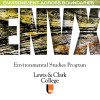Situated Research
You will learn a special approach to interdisciplinary environmental scholarship in the ENVS Program. We call it situated research. Below are important resources to help you understand and master situated research.
- Studying Places: Situated research is grounded in the concept of place—not place as in a location, nor exactly place as you may have heard about it before (e.g., in “place-based education”). Think of place as a gathering of processes and perspectives across space and time—a way for us to “get real” as we situate environmental issues in hybrid—and intriguingly messy—geographical contexts. And studying places is fun!: many of our ENVS majors, for instance, participate in overseas programs to study environmental issues in a globally diverse range of places.
- Situated Research: Here’s how to “get situated,” focusing on a special approach we call the hourglass. This approach to research starts with a broad environmental issue (top of the hourglass) and poses one or more general framing questions, then zooms in to a particular place or situated context (middle of the hourglass) and poses a focus question to guide your research, from which you’ll zoom out again (bottom of the hourglass) to consider implications, followup research, etc. for your broad issue.
- Data, Methods, Theories, Frameworks: The situated approach calls for both empirical and conceptual sophistication. Data (information) and methods (ways to obtain information) are key to good empirical research; but data and methods are guided by broader theories (explanatory hypotheses), which themselves are guided by even broader frameworks (approaches to knowledge and reality).
- Thesis Statements: When you communicate the results of situated research, you often present the gist of your argument as a thesis statement, which suggests an answer to your focus question in a manner that also sheds light on your framing question. As such, your thesis statement often touches on descriptive/explanatory as well as evaluative/instrumental dimensions of your chosen environmental issue (see here for information on those four dimensions).
Environmental Studies is located in room 343A of John R. Howard Hall on the Undergraduate Campus.
MSC: 62
email envs@lclark.edu
voice 503-768-7790
fax 503-768-7620
Symposium Advisor Jessica Kleiss
Environmental Studies
Lewis & Clark
615 S. Palatine Hill Road MSC 62
Portland OR 97219
